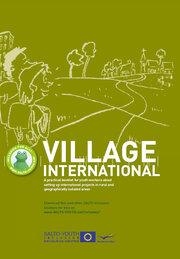Make young people proud of their rural heritage
It is a growing trend in Europe that young people are leaving the countryside to seek education, a professional career, life and luck in the cities - this phenomenon is called brain drain. In addition, many young people see living in the countryside as a barrier and not as a fortune. Many do not identify with their rural heritage and are not proud of their roots. Is there anything you as a youth worker can do?
A conscious decision is a good decision
- The rural areas are not better than the cities - but the opposite is also true. Even though many young people see the cities as places full of action and opportunity, this is just as much a biased view as that of a countryside-lover. People do have different preferences - but people cannot make a decision until they know both options.
- Youth workers can help young people consider both the positives and the negatives of living in the countryside and of moving to the cities. Often, young people tend to focus on the negatives of the rural areas, and all the excitement of the city. You can do some activities to counter-balance this.
- Why not do a plus-minus exercise with the young people, listing all the positive things about the countryside on one side (+) of a piece of paper, and the negative things on the other side (-)? This helps people become more conscious of the pros and cons of staying and moving.
- Remember: It is impossible to change people's minds by force... If it is obvious that you are trying to influence the young people, they will have a tendency to do the opposite... Be warned!
^^ top ^^
Create opportunities for young people
- If you want to have young people staying in the villages instead of leaving for the cities, you will have to provide in the countryside what they would otherwise look for in the cities - and you will have to avoid the reasons that cause them to leave.
- Many young people leave for the cities to study and never come back. If there were more educational opportunities locally (of equal or better quality), they would be less likely to leave. You could think about distance-learning , or professional education with a local craftsman or business person.
- If youngsters want to leave the village because there are no leisure time activities, you could change this by offering attractive and interesting youth work activities. The more young people are committed to your youth work, the more reasons they will have to come back to it whenever they can. Involving them as much as possible in 'their' youth organisation (e.g. co-organising activities, participating in decision making, social networking,...) will give them ownership and commitment.
- This is a bit similar within the local community. If they can actively influence life in the village to make it better suited to their needs and wishes, they will work on creating a place that is theirs - and they will be less likely to leave. This could be done by an active rural youth organisation, a youth parliament, participation with or consultation by local politicians...This way rural young people feel accepted and their needs are heard.
- Similarly, if there are not enough sports facilities (e.g. sports hall, fitness studio, swimming pool, etc.) you could develop more outdoor sports activities such as hiking, jogging, skiing in winter, swimming in the lakes in summer, etc.
- If youngsters see a future for themselves within their rural community, they are not very likely to leave the countryside. Job opportunities and housing are vital elements. Of course it is not your job as a youth worker to create employment or affordable housing, but you could encourage the local authorities to do so.
- You could do activities about young people's roots, something that makes them proud of their rural heritage. Mostly, people are only proud of other people. You could organise a youth exchange on the issue of 'my countryside' (like the project 'countryside lifestyle'). When the young people can compare their reality with that of others, they become more aware of the positive points about their place and the relatively high quality of life in the countryside.
A big issue here is the participation of young people in decision-making on a local level. The 'Revised European Charter on the participation of young people in local and regional life' of the Congress of Local and Regional Authorities in Europe is a useful tool to work on this. Available from www.coe.int/congress/ or download it below.
Do you have suggestions about making young people stay in their rural areas, instead of leaving for the cities? Share them below (log in with your SALTO username or create one to leave comments)
^^ top ^^
 www.salto-youth.net/
www.salto-youth.net/
VillageInternational/

 Protected from exclusion
Protected from exclusion
Downloads
The following downloads are available:
- Village International - setting up international projects with rural youth - 2007
A step by step manual through the different stages of setting up a youth project in your rural or geographically isolated area. With lots of practical tips and tricks. Based on SALTO TC Rural 2007. (Rightclick & download to your PC)
